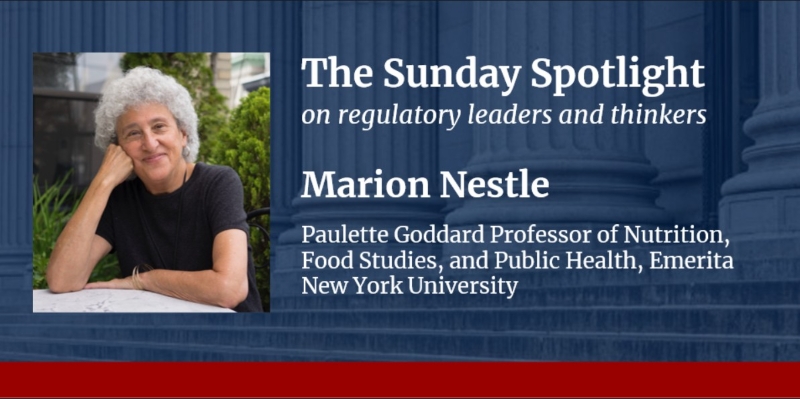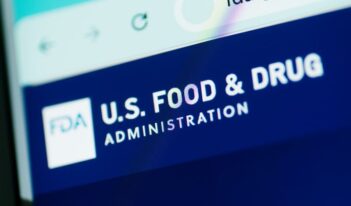
Marion Nestle discusses changes to agencies that would create a safer food environment.
In a conversation with The Regulatory Review, Marion Nestle, the Paulette Goddard Professor of Nutrition, Food Studies, and Public Health, Emerita at New York University, shares her perspective on the importance of a single food safety agency, greater governmental authority over recalls, and potential changes to the cultures of food production facilities.
In November 2024, the Centers for Disease Control and Prevention (CDC) reported one death and over 30 hospitalizations resulting from a multistate outbreak of E. coli linked to onions served at McDonald’s restaurants. Just months before, a high profile outbreak of Listeria at a Boar’s Head plant reportedly caused 10 deaths.
The food safety regulatory system is currently managed by multiple federal agencies that each has its own jurisdiction. In response to news of the Boar’s Head outbreak, Nestle stated that “the food safety system … needs an overhaul. Lives are at risk.”
Nestle has served as chair of New York University’s Steinhardt School of Nutrition, Food Studies, and Public Health. She previously worked as a senior nutrition policy advisor and staff director for nutrition policy at the U.S. Department of Health and Human Services (HHS).
She has written numerous books, including Safe Food: The Politics of Food Safety. Nestle received Hunter College Food Policy Center’s first NYC Food Policy Changemaker Award and The Edinburgh Medal for her contributions to science and society. Nestle earned a Ph.D. in molecular biology and a master’s degree in public health nutrition from the University of California, Berkeley.
The Regulatory Review is pleased to share the following interview with Marion Nestle.
The Regulatory Review: You have called on Congress to unify the functions of the U.S. Food and Drug Administration (FDA) and the U.S. Department of Agriculture (USDA). What benefits would result?
Nestle: The big issue of overlap is food safety. USDA oversees the safety of meat and poultry, and FDA regulates the safety of pretty much everything else, as if confined animal feeding operations never exist alongside vegetable farms. Also, there are absurd inconsistencies. FDA regulates the safety of eggs in their shells, whereas USDA regulates egg products. If a sandwich has two slices of bread, it is FDA-regulated; if it is open-faced, USDA is responsible.
The agencies operate under different legislative mandates. FDA can regulate safety on farms, but USDA cannot. FDA is responsible for 80 percent of the food supply but gets 20 percent of the available funding. USDA gets 80 percent of the funding but is only responsible for 20 percent of the food. If the agencies operated under one mandate, the system could combine resources. As it is, FDA is so underfunded that it can only inspect one or two percent of food imports.
TRR: What factors have prevented the creation of a single food safety agency?
Nestle: Politics, of course. For reasons of history, FDA, which is an agency of the Public Health Service in HHS, gets its funding from congressional agricultural committees. These committees are necessarily more interested in funding USDA than FDA, and FDA has been underfunded for decades. Removing food safety from USDA would remove resources from that agency.
The barriers are logistical, financial, and legislative. Congress, which seems unable to budge on anything, would have to agree on how to create a single agency.
TRR: In 2024, the CDC notified the public of multiple foodborne illness outbreaks, including sickness from Listeria and E. coli. What changes to agency policy or practice would improve detection of food safety risks?
Nestle: FDA has the authority to require everyone involved in production of the foods it regulates—from farm to factory—to develop food safety plans that involve analyzing where in production safety lapses could occur, designing mechanisms to avoid those lapses, and monitoring and testing to make sure those steps were followed and are working. USDA has no legal authority on farms.
But even with the most rigorous legislation, the system will not work unless there is an adequate “culture of food safety” within every production facility. By that I mean that everyone involved in food production, from the CEO to the assembly line worker, must diligently follow a safety plan in spirit as well as letter. This culture has to be internal to the facility. More inspection and enforcement would help, but the culture is critical. Nearly all outbreaks of foodborne illness can be traced to cultural lapses such as forgetting to check temperatures or overlooking leaky pipes.
TRR: What changes could improve federal response once a food safety risk or outbreak is detected?
Nestle: It would be great if FDA could order recalls of unsafe foods and if Congress gave USDA that authority too. As it is, the agencies pretty much have to plead with companies to voluntarily recall their products. FDA and USDA need the authority to act more forcefully and more quickly. With that said, it is often difficult to figure out what food is responsible for an outbreak, and it is understandable that the agencies want to be sure before they insist on a recall and find out later that something else was at fault.
TRR: Can regulatory efforts at the state or local level fill gaps in federal action?
Nestle: They can and do. Some states have health departments with food safety sections that work closely with food companies to make sure that safety plans are well designed and conducted diligently. Other states could do better.
TRR: Aside from agencies with direct food safety authority, how may other agencies, entities, or actors could become more involved in achieving your vision of a safe food environment?
Nestle: We are talking about food safety here. Other agencies are already involved. The U.S. Environmental Protection Agency, for example, regulates potentially toxic pesticides and herbicides that get on food. The National Institutes of Health is responsible for research on safety issues. The CDC deals with outbreaks. Food is related to so many other aspects of society that numerous agencies have a stake in the system, but USDA and FDA are the big ones.



